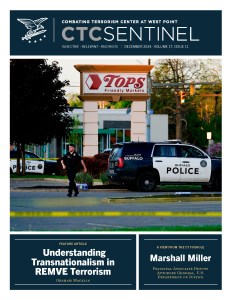From the Editor
In the feature article, Graham Macklin evaluates ‘transnationalism’ as an analytical lens for understanding racially or ethnically motivated violent extremist (REMVE) terrorism. He writes that “the ‘transnational’ dimension of REMVE terrorism is often ill-defined and misunderstood, leading to misconceptions about the nature of such networks that in turn exaggerate their ‘global’ reach. … Nevertheless, understanding the transnational dimension of social media and its role in the radicalization of lone-actor REMVE terrorists is increasingly important. Online REMVE communities rather than physical organizations per se serve as the medium through which violent ideologies are spread; where lessons from previous attacks are learned and internalized; where the perpetrators of violence are revered; and where further acts of violence are encouraged and incited.”
Our interview is with Marshall Miller, the outgoing Principal Associate Deputy Attorney General of the United States, who oversaw the day-to-day running of the Department of Justice and earlier in his career prosecuted or supervised the prosecution of several high-profile terrorism cases. When it comes to the CT mission of the DOJ, he says that “the number-one piece of advice would be that prevention and disruption always have to remain the top priority. And in order to achieve prevention and disruption, we need to double down on what has been working and continually modernize and calibrate to meet the varied threats. There is a system … that works; it involves coordination and information sharing and intelligence gathering from all sources—both in the intelligence community, of course, but also law enforcement and the Department of Defense.”
Michael Horton outlines the Houthis’ expanding footprint in the Horn of Africa. He writes that securing supply chains and funding for their unmanned vehicle and missile programs, “especially funding and supplies that are independent of Iran, is a key objective for the Houthi leadership” and that “both AQAP and al-Shabaab now act as facilitators and, to a degree, as partners that help the Houthis smuggle needed materiel into and out of Yemen.”
Christopher Faulkner, Raphael Parens, and Marcel Plichta look at Africa Corps, Russia’s replacement for the Wagner Group in Africa. They write: “Russia’s Sahel strategy, and arguably its Africa strategy writ large, is one that promotes more disruption and chaos, not less. … Russia has limited CT experience and diminished incentives to invest the resources necessary to genuinely solve the complex security crises in Burkina Faso, Mali, Niger, and across the greater Sahel—crises that demand much more than a military solution. Adding to the complications is the potential loss of Russian bases in Syria following the overthrow of the Assad regime. Any resulting Russian forfeiture of its bases … could make airlifting goods to Libya, the Sahel, and Central Africa significantly more challenging in the short term,” with implications for the endurability of Sahelian juntas propped up by Africa Corps.
Paul Cruickshank, Editor-in-Chief
 Skip to content
Skip to content

